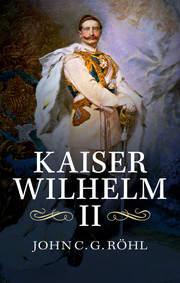Book contents
- Frontmatter
- Dedication
- Contents
- List of figures
- Acknowledgements
- Preface to the English edition
- Preface to the German edition
- Acknowledgements
- Overview: Wilhelm the Last, a German trauma
- Part I 1859–1888: The Tormented Prussian Prince
- Part II 1888–1909: The Anachronistic Autocrat
- Part III 1896–1908: The Egregious Expansionist
- 10 The challenge to Europe: Weltmachtpolitik and the battlefleet
- 11 The Russo-Japanese War and the meeting of the emperors on Björkö (1904–1905)
- 12 War in the west? The landing in Tangier and the fiasco of Algeciras (1905–1906)
- 13 The intensification of the Anglo-German conflict
- Part IV 1906–1909: The Scandal-Ridden Sovereign
- Part V 1908–1914: The Bellicose Supreme War Lord
- Part VI 1914–1918: The Champion of God’s Germanic Cause
- Part VII 1918–1941: The Vengeful Exile
- Notes
- Index
13 - The intensification of the Anglo-German conflict
Published online by Cambridge University Press: 05 September 2014
- Frontmatter
- Dedication
- Contents
- List of figures
- Acknowledgements
- Preface to the English edition
- Preface to the German edition
- Acknowledgements
- Overview: Wilhelm the Last, a German trauma
- Part I 1859–1888: The Tormented Prussian Prince
- Part II 1888–1909: The Anachronistic Autocrat
- Part III 1896–1908: The Egregious Expansionist
- 10 The challenge to Europe: Weltmachtpolitik and the battlefleet
- 11 The Russo-Japanese War and the meeting of the emperors on Björkö (1904–1905)
- 12 War in the west? The landing in Tangier and the fiasco of Algeciras (1905–1906)
- 13 The intensification of the Anglo-German conflict
- Part IV 1906–1909: The Scandal-Ridden Sovereign
- Part V 1908–1914: The Bellicose Supreme War Lord
- Part VI 1914–1918: The Champion of God’s Germanic Cause
- Part VII 1918–1941: The Vengeful Exile
- Notes
- Index
Summary
At the beginning of 1904 Wilhelm II had announced his intention of appointing his Flügeladjutant and close friend Helmuth (‘Julius’) von Moltke, nephew of the celebrated field marshal, to be Count Alfred von Schlieffen’s successor as chief of the Great General Staff. If the pliable Bülow owed his appointment to the promptings of Philipp Eulenburg, and Tirpitz his to the influence of the anglophobic chief of the Kaiser’s Naval Cabinet Admiral Freiherr Gustav von Senden-Bibran, the choice of Moltke to head the General Staff was entirely the Supreme War Lord’s own decision; indeed, it was a truly alarming example of personal rule at its most extreme. As the bearer of a historic name and as one of the Lange Kerls whom Wilhelm had gathered around him in conscious imitation of his seventeenth-century forebear, the brutal ‘Sergeant King’, Friedrich Wilhelm I of Prussia, Moltke had from the beginning played a certain part at court and in the Kaiser’s personal diplomacy; it was he who had taken Wilhelm’s ‘Nations of Europe!’ drawing aimed against the ‘Yellow peril’ to Tsar Nicholas II in 1895. But chief of the General Staff?! The appointment of this courtly general to the most influential post in the Prussian/German army was decided by the Kaiser against the advice of the chief of the Military Cabinet and almost all the generals in the army. Field Marshal Count von Waldersee commented, despairingly, ‘I do not believe there could be a greater humiliation for the General Staff.’ No one was more convinced of his unsuitability for the highly responsible post than Moltke himself, melancholy and fatalistic by nature and, under the influence of his wife, susceptible to the occultism of Rudolf Steiner. Yet Wilhelm insisted on his promotion, remarking ominously that ‘he did not need a General Staff, he will do everything alone with his Flügeladjutanten’. In the Kaiser ‘the sense of greatness is growing in a way that is becoming positively frightening’, Waldersee, now on his deathbed, observed.
- Type
- Chapter
- Information
- Kaiser Wilhelm IIA Concise Life, pp. 93 - 100Publisher: Cambridge University PressPrint publication year: 2014



